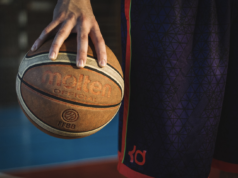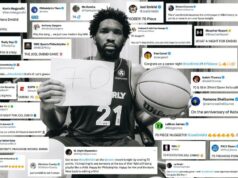Manu Ginobili and injuries seem to go hand-in-hand.
The style of play that the San Antonio Spurs guard plays with makes him susceptible to any injury out there, no matter how little it may be. In recent years Ginobili has taken a more cautious approach, whether it’s due to him actually playing injured or just a concerted effort on his part is unknown.
This past season Ginobili was much maligned by the media and fans for his performance in the Finals. The weight of the criticism was heavy on Ginobili and he opened up to La Nacion (via Pounding the Rock) about some things that were weighing on his mind.
You've spent the last few years making decisions on the court, sometimes risky and inadvisable ones. How was the process of deciding between retiring and keep playing?
By the end of the season–and I mean the regular season and not the playoffs– I thought about it a lot. I was so tired of it. I hadn't suffered a muscle strain in my whole life and I went through three in four months. I felt negative, fed up. And I thought about retiring. I hadn't come close to making up my mind but I thought it was something I had to discuss with my wife, "what if…?" She told me that it was my decision and she was fine either way. But when I recovered physically I started to feel better about it all. When the season ended I grieved for 48, 72 hours and I didn't feel retired. I knew something was missing, that I still wanted to play.
During those talks with your wife, how did you imagine the future after you retired? Where you dreading the decision?
I thought I could definitely take a year off, to relax, for sure. Call it basketball detox. Spend a lot of time here, in Argentina. And then, with the game over, figure out where to go from there. But at that point I just felt like saying "that's it, enough of having to get in shape constantly, enough of the pressure, of thinking about whether my leg can take it. I want to be at peace, with my wife and my kids. Travel and get to know different places, which is something I never got to do." That's what I was thinking about then. But then that changes and you realize you'll have time for that. The fire is still there when I play and I want to enjoy that.
What was weighing on you? Because you clearly weren't and aren't tired of basketball
The physical part. Having to keep rehabilitating and getting in shape after injuries. Having to play with the parking break on because I'm coming back from a muscle strain. That wore me out and it was hard. I have a great time when I'm healthy and playing, I feel lucky playing with the team and coaching staff I play for. But the physical problems drained me.
This year, like never before, you looked weak
A lot of times this year I've been told I looked weak, vulnerable, fragile. I have no reason to hide. I'm no less of a man for feeling that way or for having played poorly. Yes, so what's the problem? I will be criticized? Fine. I swear I gave everything I had and I tried to win, like I always have. Sometimes it happens and sometimes it doesn't. I won't blush or feel embarrassed for saying it. I felt vulnerable and I expressed it. I didn't have a reason not to. It's true. It was the first time I've felt that way.
How was it like living with criticism for the first time in your career?
Strange. You usually read things in the newspaper or hear them through other people. But during the playoffs, for example, I'm isolated,  bulletproof. I don't read anything, don't watch highlights, nothing. At first those criticisms didn't reach me, I only had to deal with my own. I knew how I was playing and what I can give the team. But when I started to get questions in a specific tone, that's when I realized: "Something must be happening. I'm being criticized. Otherwise, they wouldn't ask me that." I started to realize that they were saying I wasn't playing at my level and it was weird. Especially in the playoffs. It had happened in other times of the season, when I was injured and they were saying that it wasn't the same, that the best of Ginobili was in the past. This time it was during the playoffs. It was weird and it hurt. Because I have a well developed ego and, like I said, I was always proud to say I never under-performed in the playoffs. I had that credibility in my career. So when that happened this season, it hurt.
bulletproof. I don't read anything, don't watch highlights, nothing. At first those criticisms didn't reach me, I only had to deal with my own. I knew how I was playing and what I can give the team. But when I started to get questions in a specific tone, that's when I realized: "Something must be happening. I'm being criticized. Otherwise, they wouldn't ask me that." I started to realize that they were saying I wasn't playing at my level and it was weird. Especially in the playoffs. It had happened in other times of the season, when I was injured and they were saying that it wasn't the same, that the best of Ginobili was in the past. This time it was during the playoffs. It was weird and it hurt. Because I have a well developed ego and, like I said, I was always proud to say I never under-performed in the playoffs. I had that credibility in my career. So when that happened this season, it hurt.
 bulletproof. I don't read anything, don't watch highlights, nothing. At first those criticisms didn't reach me, I only had to deal with my own. I knew how I was playing and what I can give the team. But when I started to get questions in a specific tone, that's when I realized: "Something must be happening. I'm being criticized. Otherwise, they wouldn't ask me that." I started to realize that they were saying I wasn't playing at my level and it was weird. Especially in the playoffs. It had happened in other times of the season, when I was injured and they were saying that it wasn't the same, that the best of Ginobili was in the past. This time it was during the playoffs. It was weird and it hurt. Because I have a well developed ego and, like I said, I was always proud to say I never under-performed in the playoffs. I had that credibility in my career. So when that happened this season, it hurt.
bulletproof. I don't read anything, don't watch highlights, nothing. At first those criticisms didn't reach me, I only had to deal with my own. I knew how I was playing and what I can give the team. But when I started to get questions in a specific tone, that's when I realized: "Something must be happening. I'm being criticized. Otherwise, they wouldn't ask me that." I started to realize that they were saying I wasn't playing at my level and it was weird. Especially in the playoffs. It had happened in other times of the season, when I was injured and they were saying that it wasn't the same, that the best of Ginobili was in the past. This time it was during the playoffs. It was weird and it hurt. Because I have a well developed ego and, like I said, I was always proud to say I never under-performed in the playoffs. I had that credibility in my career. So when that happened this season, it hurt.
Are you motivated by criticism?
Yeah, a little bit. I can't say it works all the time. Because the truth is I couldn't make shots throughout the playoffs. I wanted to run over everyone and everything and I couldn't. When things were at their worst, after games four and six, I came back and had my best games. So it helped at times but I couldn't sustain that determination, that anger.
So are you energized by anger?
Yes. And I realized then and there. But there were other times when I couldn't summon it. The times I played facing that anger, I did well. But then I would let my guard down and couldn't sustain it. It was very frustrating and painful, because I used to have that fuel, an engine that would never stop and I couldn't find that in these playoffs. Anger invariably generates determination.
Do you think this team will be remembered despite the loss?
No, long term, it won't be. But we, the ones who were part of it, will remember it because there can't be such a thin line between frustration and ecstasy. It wouldn't be logical. You try to find solace in that. But those that weren't there, those looking at a history of the results of the finals won't remember it. They'll see we were as good as Seattle or Utah were when they lost to the Chicago Bulls.
And did that influenced your decision to keep going? Evening up the score?
I don't feel like I'm coming back looking for revenge. I'm coming back because I enjoy myself when I'm healthy. When I'm injured– that's when I want to end it and do something else. When I'm healthy and I'm playing 30 minutes a game with no injury concerns I do it for the pleasure of playing with Duncan, Parker and Popovich. I have fun, I feel as passionate about it as ever. It's not that I want to go after Lebron or get my shooting percentage back to 40%–or whatever it was. It has nothing to do with revenge.
Ginobili will always be a fan favorite in San Antonio. Though his struggles played out for the entire world to see, fans are quick to forget that this is the same person that helped bring in 3 of the 4 championships banners that are hanging up in the AT&T Center today. Holding players accountable for their play is fine, but players like Ginobili who have brought so much to an organization and a city, should be able to leave the game under their own terms. He is aware of his play from his comments and is looking to be in the best shape he can be coming into this next season.
He will not be playing with the Argentine national team this summer, which is a rarity, so he should be even more refreshed. Also ProjectSpurs.com’s own Paul Garcia has confirmed that the Spurs even sent trainer Matthew Herring to Argentina to work and train with Ginobili.
This coming season should showcase a motivated and hungry Ginobili. It’s unfair to compare him to a younger version of himself, but the one constant that Ginobili will never be short on is his competitive hunger. His competitiveness and willingness to do anything within the game to win is unmatched by most in the league today. It’s that extra bit of drive that Ginobili plays with which always makes him border on the line of excellence and tragedy.
Do Spurs fans think we will see a motivated Ginobili this season?





